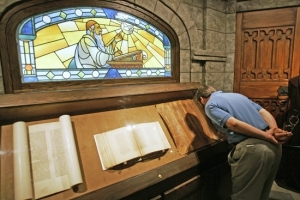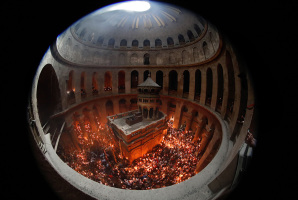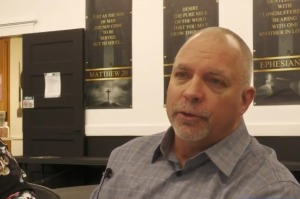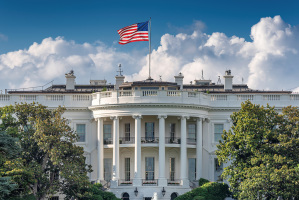Christian voters swayed 2024 presidential election, data show
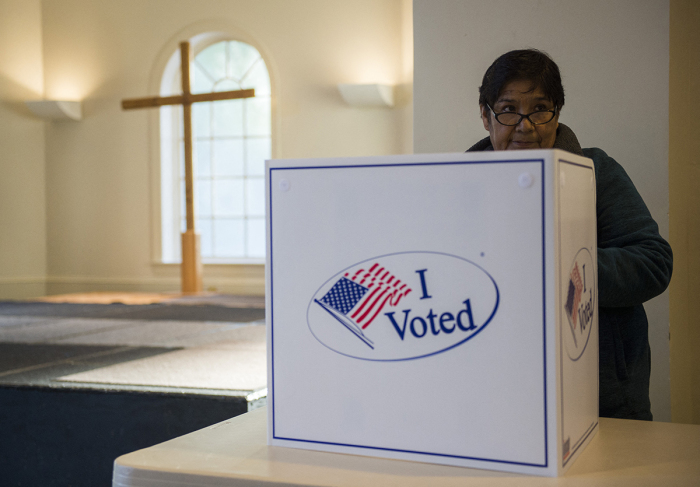
Self-identified Christian voters are being credited with making a difference in the outcome of the 2024 presidential election as data show that the faithful overwhelmingly backed President-elect Donald Trump, according to a new report.
George Barna, director of the Cultural Research Center at Arizona Christian University, published a report last week highlighting the findings of his organization’s post-election research conducted in the three days following the Nov. 5 election. Data included in the report is based on “extensive interviews with a national sample of 2,000 voting-age adults.” The survey had a margin of error of +/- 3 percentage points.
The main finding from the report is that self-identified Christians helped deliver the White House to Trump, the Republican presidential nominee, who defeated Democratic Vice President Kamala Harris: “Among self-identified Christians, President Trump won a 56% share of their vote. And because Christians represented 72% of the voters who turned out, their support for the re-elected Republican made the difference in the race.”
“Although Harris won a larger share of the non-Christian vote than Trump’s share of the Christian votes, Christians outnumbered non-Christian voters by a more than five- to-two margin—delivering the decisive Nov. 5 victory to President Trump,” the report added.
The data collected from the Cultural Research Center detailed information about turnout among Christian denominations and certain groups of Christian voters, as well as support for the two major candidates among voters within religious subgroups. At 99%, turnout was highest among the group of voters defined as Spiritually Active Governance Engaged Conservative Christians, also known as SAGE Cons.
Characteristics of SAGE Cons include “consistent participation and belief in core Christian principles and religious endeavors, plus above-average political attentiveness and participation, possessing conservative political ideology, and a commitment to Jesus Christ as Lord and Savior.” While the turnout rate did not budge among SAGE Cons from 2020 to 2024, most other groups of Christian voters examined saw their turnout rates drop or remain stagnant between the two presidential elections.
The exceptions were Catholics, whose turnout rate increased from 67% to 70%, and Integrated Disciples, defined as those possessing a biblical worldview. Sixty-seven percent of Integrated Disciples turned out in 2024, compared to 64% in 2020.
The turnout rate among those who attend a Pentecostal church was measured at 62% in both 2020 and 2024. Turnout dipped slightly from 66% to 65% among Christians who attend mainline Protestant churches, while a larger decrease from 65% to 59% was recorded among their counterparts who attend Evangelical churches. Fifty-nine percent of Protestants as a whole turned out in 2024, compared to 62% four years ago.
Those theologically defined as born-again Christians, who are “confident they will live eternally in Heaven solely because they have confessed their sins to God, repented, and trust Jesus as their Savior,” constituted 58% of the electorate in 2024, compared to 64% in 2020. Among self-identified Christians, turnout dropped from 64% to 56%.
In the 2024 election, Trump was the preferred candidate among every subgroup of Christian voters. He secured the overwhelming majority of the vote from SAGE Cons (90%) along with 75% of the vote from Integrated Disciples and 74% of the vote from Pentecostal church attendees. Trump also received support from a substantial majority of Evangelical church attenders (64%), theologically-defined born-again Christians (64%) and Protestants (60%).
Smaller majorities of mainline Protestant church attenders (56%), self-identified Christians (56%) and Catholics (51%) backed Trump over Harris. This conflicts with exit polls finding that 56% of Catholics voted for Trump in the 2024 election.
Barna issued a statement reflecting on why Christians' support for Trump was so high, explaining that the candidate “did a better job than Kamala Harris of representing hallowed Christian characteristics such as the importance and support of family, the rule of law, limited government authority, financial responsibility, and the like.”
“In contrast, Vice President Harris’ doubling down on abortion on-demand, open borders, transgenderism, and central tenets of socialistic governance clashed with the core values of the nation’s dominant spiritual perspectives,” he noted.
“Millions of President Trump’s votes came from people who would not vote for him as the nation’s pastor or as a behavioral model for their children, but who perceived he would protect their traditional, cherished values and lifestyle preferences while Harris was more likely to limit or ban such ways of life.”
The research also asked voters what role their churches played in election-related activities ahead of the 2024 election. A majority of all Christian voters said their churches provided teaching about the Bible’s stand on specific issues (54%), with higher shares of Pentecostal and Charismatic church attendees (69%), Evangelicals (67%) and mainline Protestants (56%) indicating that their churches took this course of action than non-denominational church attendees (52%) and Catholics (41%).
A majority of all Christians (53%) reported that their churches encouraged congregants to vote, without endorsing a particular candidate. Majorities of Pentecostal and Charismatic church attendees (65%), Evangelical church attendees (61%) and mainline Protestant church attendees (53%) maintained that their churches pushed civic participation as did half of non-denominational church attendees (50%) and slightly less than half of Catholics (48%).
By contrast, less than half of Christians told pollsters that their churches provided written information about the Bible’s stand on particular issues (46%), invited or hosted candidates to speak at the church (30%), provided voter guides (28%), registered new voters (26%) and endorsed or recommended particular candidates (23%).
While majorities of Pentecostal and Charismatic church attendees (65%) and Evangelical church attendees (54%) said their churches gave them written information with a biblical perspective on contemporary issues, less than half of Christians who attend all other types of churches reported otherwise. Less than half of Christians across all religious subgroups recalled their churches engaging in the remaining election-related activities.
Barna also urged pastors to take a more active role in the political sphere. “Parents, pastors, and other people of influence must intentionally and strategically commit to shaping the worldview and values of the nation — especially among children — to coincide with the beliefs and values they just voted to protect,” he said. “Successfully refining the worldview and values of the American people is the foundation required to facilitate desired national outcomes such as unity, equality, opportunity, safety, peace, justice and joy.”
Ryan Foley is a reporter for The Christian Post. He can be reached at: ryan.foley@christianpost.com
















